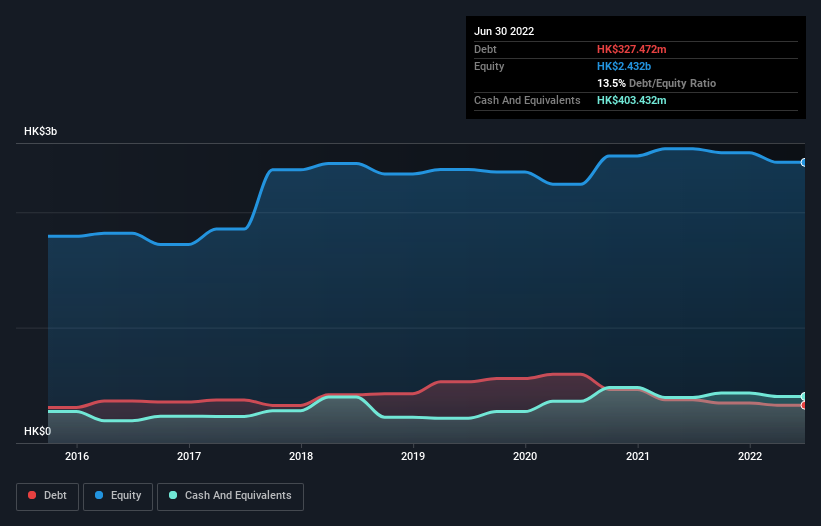Does Embry Holdings (HKG:1388) Have A Healthy Balance Sheet?
Some say volatility, rather than debt, is the best way to think about risk as an investor, but Warren Buffett famously said that 'Volatility is far from synonymous with risk.' So it might be obvious that you need to consider debt, when you think about how risky any given stock is, because too much debt can sink a company. As with many other companies Embry Holdings Limited (HKG:1388) makes use of debt. But is this debt a concern to shareholders?
When Is Debt Dangerous?
Generally speaking, debt only becomes a real problem when a company can't easily pay it off, either by raising capital or with its own cash flow. Part and parcel of capitalism is the process of 'creative destruction' where failed businesses are mercilessly liquidated by their bankers. However, a more common (but still painful) scenario is that it has to raise new equity capital at a low price, thus permanently diluting shareholders. Of course, debt can be an important tool in businesses, particularly capital heavy businesses. When we examine debt levels, we first consider both cash and debt levels, together.
Check out our latest analysis for Embry Holdings
How Much Debt Does Embry Holdings Carry?
You can click the graphic below for the historical numbers, but it shows that Embry Holdings had HK$327.5m of debt in June 2022, down from HK$374.1m, one year before. But it also has HK$403.4m in cash to offset that, meaning it has HK$76.0m net cash.

A Look At Embry Holdings' Liabilities
The latest balance sheet data shows that Embry Holdings had liabilities of HK$317.0m due within a year, and liabilities of HK$444.4m falling due after that. Offsetting this, it had HK$403.4m in cash and HK$75.8m in receivables that were due within 12 months. So its liabilities outweigh the sum of its cash and (near-term) receivables by HK$282.2m.
Given this deficit is actually higher than the company's market capitalization of HK$274.6m, we think shareholders really should watch Embry Holdings's debt levels, like a parent watching their child ride a bike for the first time. Hypothetically, extremely heavy dilution would be required if the company were forced to pay down its liabilities by raising capital at the current share price. Given that Embry Holdings has more cash than debt, we're pretty confident it can handle its debt, despite the fact that it has a lot of liabilities in total. There's no doubt that we learn most about debt from the balance sheet. But you can't view debt in total isolation; since Embry Holdings will need earnings to service that debt. So when considering debt, it's definitely worth looking at the earnings trend. Click here for an interactive snapshot.
Over 12 months, Embry Holdings made a loss at the EBIT level, and saw its revenue drop to HK$1.5b, which is a fall of 14%. That's not what we would hope to see.
So How Risky Is Embry Holdings?
While Embry Holdings lost money on an earnings before interest and tax (EBIT) level, it actually generated positive free cash flow HK$154m. So although it is loss-making, it doesn't seem to have too much near-term balance sheet risk, keeping in mind the net cash. Given the lack of transparency around future revenue (and cashflow), we're nervous about this one, until it makes its first big sales. To us, it is a high risk play. When analysing debt levels, the balance sheet is the obvious place to start. But ultimately, every company can contain risks that exist outside of the balance sheet. These risks can be hard to spot. Every company has them, and we've spotted 2 warning signs for Embry Holdings (of which 1 makes us a bit uncomfortable!) you should know about.
At the end of the day, it's often better to focus on companies that are free from net debt. You can access our special list of such companies (all with a track record of profit growth). It's free.
Valuation is complex, but we're here to simplify it.
Discover if Embry Holdings might be undervalued or overvalued with our detailed analysis, featuring fair value estimates, potential risks, dividends, insider trades, and its financial condition.
Access Free AnalysisHave feedback on this article? Concerned about the content? Get in touch with us directly. Alternatively, email editorial-team (at) simplywallst.com.
This article by Simply Wall St is general in nature. We provide commentary based on historical data and analyst forecasts only using an unbiased methodology and our articles are not intended to be financial advice. It does not constitute a recommendation to buy or sell any stock, and does not take account of your objectives, or your financial situation. We aim to bring you long-term focused analysis driven by fundamental data. Note that our analysis may not factor in the latest price-sensitive company announcements or qualitative material. Simply Wall St has no position in any stocks mentioned.
About SEHK:1388
Embry Holdings
An investment holding company, designs, researches, develops, manufactures, trades in, and sells ladies brassieres, panties, swimwear, sleepwear, and others.
Adequate balance sheet and slightly overvalued.
Market Insights
Community Narratives




